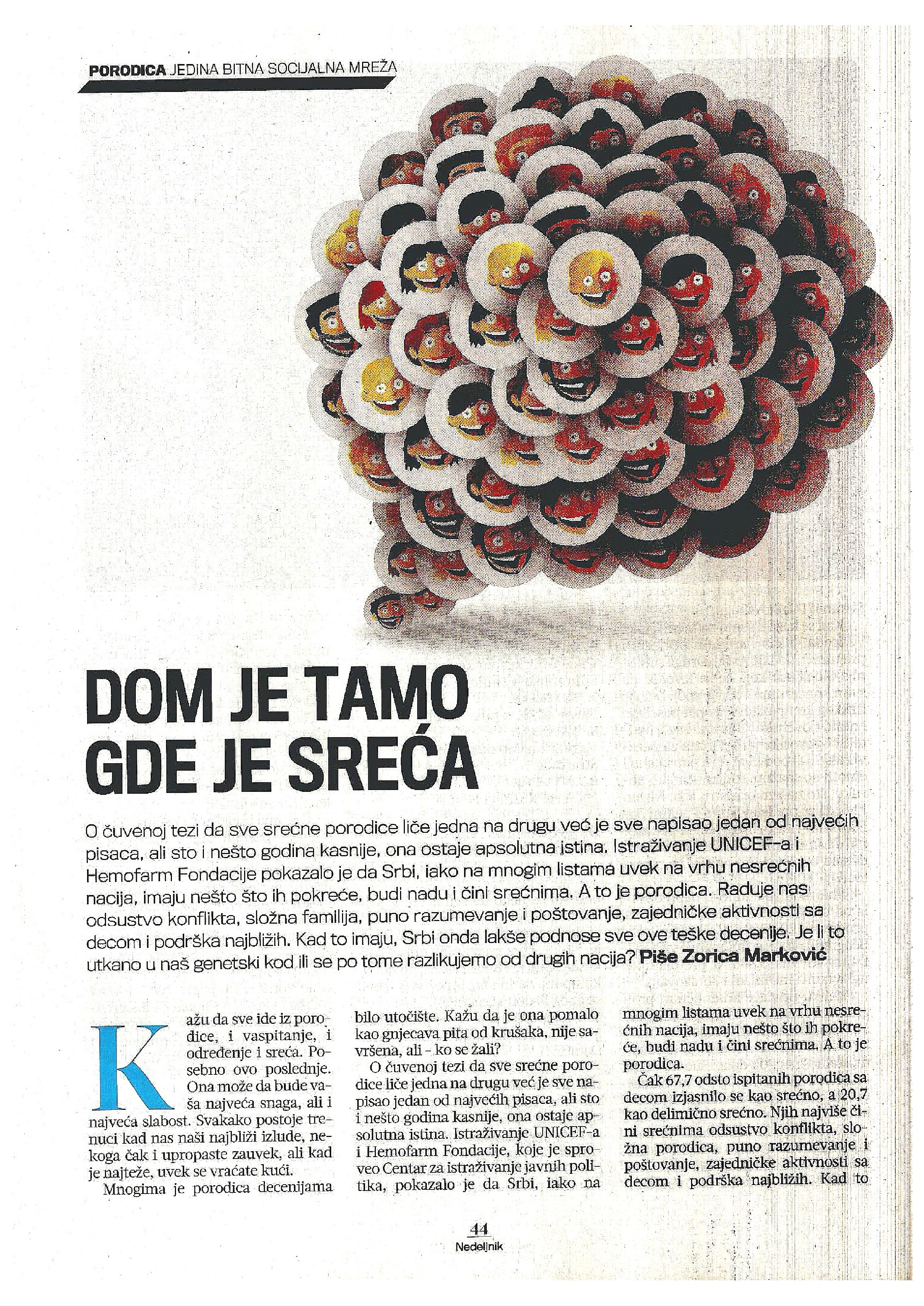Family happiness and youth aggression: When mom and dad are not like they used to be
Family happiness and youth aggression: When mom and dad are not like they used to be
Maybe it's true that ''all happy families are alike'' as it says at the beginning of Tolstoy's novel Anna Karenina, but that does not make it easier for unhappy families and society to find a way to restore the balance that has been disturbed.
The Public Policy Research Centre has started a research on life-satisfaction related to family life in Serbia and happiness of family members in families with children.
It is a topic that can be discussed on a daily basis considering the headlines of newspapers. According to national statistics, which is quoted by the ''NIN weekly'', about 5,000 minors from all social classes are searching for the adrenalin cure on the streets of Serbia. They go around districts, schools, neighborhoods, organized in local juvenile gangs. According to the official data of the Statistical Office of the Republic of Serbia, about 30% of them is located in Belgrade, 35% in Vojvodina and 35% in the urban areas of central Serbia.

Psychologists and sociologists interviewed by the ''NIN weekly'', believe that the brutality that these juvenile gangs express is caused by anger and pain which they don’t know how to channel.
In the beginning of almost every story, according to experts, is the lack of harmony and happiness in the family. Where has it all gone? The police files, as well as the documents from reformatories reveal that there are not only poor children on the streets, but also middle-class children, whose parents used to work in big companies, had jobs, and whose lives have been changed by the crisis that has been going on for decades in this region. Psychologists say that, in those conditions, usually one of the parents gives into alcoholism, and from that point on, problems for all family members start to multiply. Due to lack of money, parents are not able to afford the things for their children that their peers, and often themselves, consider to be the status symbols, like clothes, shoes, pocket money, and that is why they are rejected by their friends. They are ignored by the society and neglected by their parents, although, formally, they are at home and have enough time to dedicate to their children. Crushed by their financial situation, parents don’t have the strength to deal with their children. On the other hand, if they do have a job, they spend a lot more time working than usual, and therefore, children are left to themselves and computers.
„Sociologists agree that family is the one that needs to create the base of trust, to teach a child that there are obligations, socially desirable behavior, the things he or she can and cannot do, what is the role of everyone in the family, who is the mother, who is the father, that there are rules that can make a child feel safe. It is also important that family resolves its own problems. If there is a problem, and it’s constantly been worked on fixing it, but the solution is not visible, the child can identify him(her)self with the problem, and think that he or she is in fact the problem”, according to the magazine. „Children's aggressiveness and violence is the response to the imposed values in society“, Marija Grbic, a social worker in the reformatory home „Vasa Stajic“ in Belgrade, told for ''NIN weekly''.
If the family is coherent and is, according to Grbic, taking care of solidarity, if it's investing in children and not being over protective, the child won't be agressive. Lack of attention and disturbed relationships will cause anger in a child and he or she will express that anger somewhere. It can react by withdrawing to itself, or it can seek an informal group to join it, because, simply, mom and dad are no longer like they used to be. And then comes spite, and the child is doing everything that is oposite to socialy accaptable rules. Because, family has lost that primary role of maintaining the value system.
Although the relationship between family, happiness and it's reverse side intuitively seems very acceptable, in the research agenda the measurement of happiness has been a subject of many discussions among experts, especially when it comes to the links between economic conditions and happiness.
The Centre's intention is to demonstrate, by exploring the concept of happiness, links between demographic, age, social and other features of families in Serbia and the feeling of life satisfaction of family members and development of children.
The research consists of two methodological components: quantitative documenting on life-satisfaction and happiness of family members and qualitative research on selected sample with in-depth interviews and focus groups. Report with research findings will be presented in December 2013. The project aims to offer material for social policies targeting support for families with children in Serbia and support to the children's welfare.






